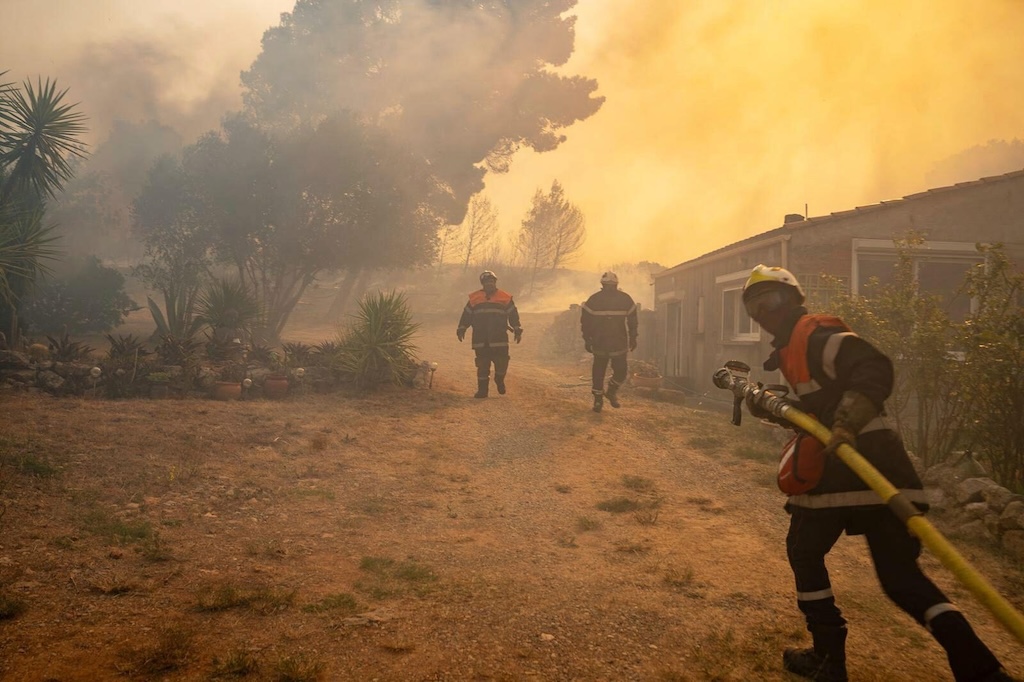Welcome to Carbon Brief’s DeBriefed.
An essential guide to the week’s key developments relating to climate change.
Global extremes
RECORD HEAT: Multiple countries experienced record heat this week. Nordic countries were hit by a “truly unprecedented” heatwave, where temperatures reached above 30C in the Arctic Circle and Finland endured three straight weeks with 30C heat, its longest heat streak in records going back to 1961, said the Guardian. Reuters reported that the United Arab Emirates (UAE) is facing “surging temperatures this summer”, following its hottest spring ever.
FIRE WEATHER: Some 81 million Americans were under air quality alerts as hundreds of wildfires burned across Canada and parts of the US, reported the Guardian. Meanwhile, a “massive” wildfire in California has “become the biggest blaze in the state so far this year” amid an intensifying heatwave, reported the Associated Press.
TORRENTIAL RAIN: A “torrent of mud” has killed at least four people in the northern Himalayan state of Uttarakhand, Reuters reported. According to the Times of India, “more than one cloudburst” hit the high-altitude district of Uttarkashi on Tuesday, triggering flash floods. It added that cloudburst risks in the Himalayan region are “projected to increase with climate change”. Meanwhile, Taiwan News said that “torrential rain in central and southern Taiwan over several days has left three dead, four missing, 49 injured and prompted 85 rescues”. Flash floods in a Myanmar-China “border town” have killed six people, according to the Straits Times.
- COP30 CHAOS: After significant delays and pressure from a UN committee, Brazil has finally launched the official accommodation platform for COP30, Climate Home News reported. It added that “significant markups and sky-high prices remained”.
- MORE TARIFFS: Donald Trump has increased tariffs on imports from India to 50% as “punishment” for the country buying Russian oil, the New York Times reported.
- CORAL BLEACHING: The Guardian said that the Great Barrier Reef suffered its biggest annual drop in live coral since 1986 in two out of the three areas that are monitored by scientists..
- ENDANGERED: Top scientific advisers in the US have announced that they will “conduct an independent, fast-track review of the latest climate science” following the Trump administration’s move to repeal the “endangerment finding”, the scientific basis for federal climate regulations, Inside Climate News reported.
10,000
The number of glaciers in the Indian Himalayas that are “receding due to a warming climate”, according to Reuters.
- Ecosystem restoration should be “pursued primarily” for biodiversity, supporting livelihoods and resilience of ecosystem services, as “climate mitigation potential will vary” | Nature Geoscience
- Attendees at the 2024 UN Environment Assembly “underestimate global public willingness to contribute 1% of their personal income to climate action” | Communications Earth & Environment
- Urban green spaces can lower temperatures by 1-7C and play a “crucial role in cooling urban environments” | Climate Risk Management
(For more, see Carbon Brief’s in-depth daily summaries of the top climate news stories on Monday, Tuesday, Wednesday, Thursday and Friday.)
Carbon Brief’s in-depth explainer unpacked the findings of a recent analysis on climate anxiety in more detail. The analysis explored 94 studies, involving more than 170,000 participants across 27 countries, to find out who is more likely to be affected by climate anxiety and what its consequences could be. The analysis suggests that women, young adults and people with “left-wing” political views are more likely to feel climate anxiety.
Heat and fire in France
This week, Carbon Brief explores how France’s media has covered the impacts of recent heatwaves and wildfires.
“We’re used to high temperatures, but we’ve never experienced heat like this [so] early in the year before,” a family member who lives in the Dordogne area of southwest France explained during a recent visit to the country.
Over recent weeks, there have been extreme heatwaves and fires across Europe, which has set new records across the continent, including in France.
France is now gripped once again by extremes. The country is currently experiencing yet another heatwave and this week faced its “largest wildfire in decades”, according to France24.
French climate scientist Dr Olivier Boucher, who is also the CEO of Klima consulting, told Carbon Brief:
“Climate change is already having visible and significant impacts in France. Heatwaves are becoming more frequent, more intense, and are occurring earlier in the season.
“This trend is accompanied by an increased risk of wildfires, particularly in southern regions, though other areas are also increasingly affected, putting the built environment at risk.”
Red alerts
In July, nearly 200 schools closed or partially closed as a result of high temperatures across the country.
Since the start of the summer, water reserves have been under close surveillance and multiple areas are facing water restrictions as a result of drought.
These water restrictions can include the use of tap water and violations can incur fines of €1,500 (£1,300). According to Le Monde, more than a third of the country is under drought alerts.
France has also experienced a “devastating summer” for fire outbreaks, according to FranceInfo. Traditional firework displays celebrating France’s Bastille day on 14 July were cancelled across the country due to forest fire risks, said Le Monde.

On 4 August, the local area of Aude, situated in the south-east, was placed under a red alert for forest fire risks.
Since then, there have been record-breaking fires in the region. BBC News reported that fires have “scorched an area larger than Paris”. The broadcaster added that the country’s prime minister, François Bayrou, linked the fires to global warming and drought, describing them as a “catastrophe on an unprecedented scale”.
Needing to adapt
Le Point explained how heatwaves impact grape vines and how winemakers have adapted their growing techniques by leaving more leaves on vines to protect the grapes from getting burned by the sun. However, it added that, “in the long run, it is necessary to think about more long-term modifications of viticulture”.
FranceInfo told the story of winegrowers losing their crops, worth millions of euros, in the recent fires in southern France, adding that it is “a real economic disaster for farmers affected by the flames”.
Le Monde interviewed French geographer Dr Magali Reghezza-Zitt, who described the nation’s preparations for dealing with climate change as inadequate. She told the newspaper:
“The gap between what needs to be done and the pace at which climate change is accelerating grows wider each year.”
Boucher added to Carbon Brief:
“All economic sectors are impacted by climate change, with agriculture among the most vulnerable. As the warming trend is projected to continue over the coming decades, adaptation will be essential – both through the climate-proofing of infrastructure and through changes in practices across sectors.”
‘GRASSROOTS ALLIANCE’: A Deutsche Welle documentary explained how unions, activists and the India Meteorological Department have joined forces to protect Delhi’s informal workers from extreme heat.
NEW RULES: A Bloomberg article said that South Africa “will seek jail time, fines and higher taxes for breaches of proposed rules to govern carbon emissions” as part of new efforts to reduce the country’s dependency on coal.
SUSTAINABLE AI?: As the AI race intensifies, the Financial Times investigated if data centers can “ever truly be green”.
- Save the Children, senior climate advisor | Salary: £61,500-£69,200. Location: London
- Irish Independent, environmental correspondent | Salary: Unknown. Location: Dublin
- Ember, interim managing director | Salary: £89,000-£100,000. Location: Remote
- British Antarctic Survey, seabird remote sensing data analyst | Salary: £41,344-£45,479. Location: Cambridge, UK
DeBriefed is edited by Daisy Dunne. Please send any tips or feedback to [email protected].
This is an online version of Carbon Brief’s weekly DeBriefed email newsletter. Subscribe for free here.
Great Job Alice Vernat-Davies & the Team @ Carbon Brief Source link for sharing this story.




